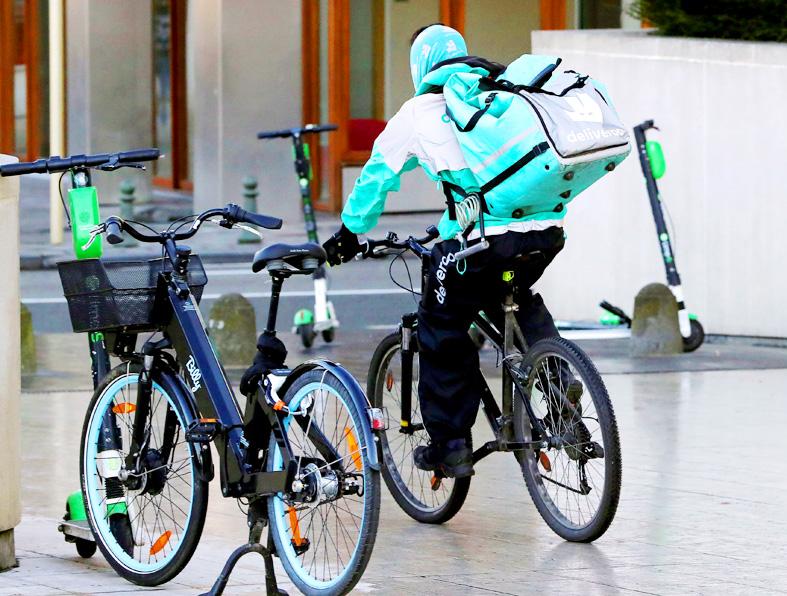Food-delivery company Deliveroo launched an initial public offering (IPO) in London that could raise billions of pounds and put the British market on track for its best-ever first quarter.
The start-up plans to raise capital by selling new stock, while existing holders would also sell shares, according to a statement yesterday that did not provide details on the size of the planned offering.
The Amazon.com Inc-backed company was valued at more than US$7 billion in its latest funding round.

Photo: Reuters
Deliveroo is to list with a dual-class share structure, effective for three years, to provide chief executive officer Will Shu (許子祥) with the stability to execute long-term plans, the company said last week.
As such, the stock is ineligible for the London Stock Exchange’s premium segment and cannot be included in benchmark indices such as the FTSE 100, despite its expected size.
This year, 13 firms have raised £4.3 billion (US$5.9 billion) in London, data compiled by Bloomberg show. Deliveroo is anticipated to add billions to this tally before the end of this month, meaning the British IPO market could be on course to surpass its biggest first quarter on record in 2006, when proceeds reached £6.4 billion.
London-based Deliveroo’s Class A shares, to be offered in the IPO, would have one vote each, while Shu would hold all of the Class B shares that carry 20 votes each. On the third anniversary of the IPO, the Class B stock would automatically convert into Class A.
After initially struggling at the start of COVID-19 lockdowns, Deliveroo got a boost as restaurants stopped providing service indoors, pushing more and more customers to order takeout meals and even groceries.
Bloomberg News in September last year reported the start-up’s plans to tap public markets.
Across Europe, beneficiaries of the pandemic-fueled migration to online services are cashing in via IPOs. Poland’s InPost SA, which operates automated parcel lockers for deliveries, surged in its Amsterdam debut in late January, while digital used-vehicle dealer Auto1 Group SE raised 1.8 billion euros (US$2.14 billion) in Frankfurt last month.
BUSIEST VENUE
London has been Europe’s busiest venue this year. Deals include British bootmaker Dr Martens PLC, which soared in its debut last month, while virtual greeting-card and gifting firm Moonpig Group PLC floated last month.
Foreign issuers are also lining up to list: Trustpilot, a Denmark-based online platform for consumer reviews, has laid out plans for a British IPO, while Russia’s largest dollar-store chain Fix Price Group Ltd made its trading debut on Friday after a US$1.7 billion offering.
Founded in 2013, Deliveroo has 115,000 food merchant partners and more than 100,000 delivery riders in the UK and overseas, according to yesterday’s statement.
The company said it plans to create a fund to help restaurants and grocers in rebuilding their businesses after the pandemic, and would also give its “longest-serving and hardest-working riders” individual payments of as much as £10,000.
Deliveroo would also make £50 million of shares available to its customers as part of a “community offer.”

The Eurovision Song Contest has seen a surge in punter interest at the bookmakers, becoming a major betting event, experts said ahead of last night’s giant glamfest in Basel. “Eurovision has quietly become one of the biggest betting events of the year,” said Tomi Huttunen, senior manager of the Online Computer Finland (OCS) betting and casino platform. Betting sites have long been used to gauge which way voters might be leaning ahead of the world’s biggest televised live music event. However, bookmakers highlight a huge increase in engagement in recent years — and this year in particular. “We’ve already passed 2023’s total activity and

Nvidia Corp CEO Jensen Huang (黃仁勳) today announced that his company has selected "Beitou Shilin" in Taipei for its new Taiwan office, called Nvidia Constellation, putting an end to months of speculation. Industry sources have said that the tech giant has been eyeing the Beitou Shilin Science Park as the site of its new overseas headquarters, and speculated that the new headquarters would be built on two plots of land designated as "T17" and "T18," which span 3.89 hectares in the park. "I think it's time for us to reveal one of the largest products we've ever built," Huang said near the

China yesterday announced anti-dumping duties as high as 74.9 percent on imports of polyoxymethylene (POM) copolymers, a type of engineering plastic, from Taiwan, the US, the EU and Japan. The Chinese Ministry of Commerce’s findings conclude a probe launched in May last year, shortly after the US sharply increased tariffs on Chinese electric vehicles, computer chips and other imports. POM copolymers can partially replace metals such as copper and zinc, and have various applications, including in auto parts, electronics and medical equipment, the Chinese ministry has said. In January, it said initial investigations had determined that dumping was taking place, and implemented preliminary

Intel Corp yesterday reinforced its determination to strengthen its partnerships with Taiwan’s ecosystem partners including original-electronic-manufacturing (OEM) companies such as Hon Hai Precision Industry Co (鴻海精密) and chipmaker United Microelectronics Corp (UMC, 聯電). “Tonight marks a new beginning. We renew our new partnership with Taiwan ecosystem,” Intel new chief executive officer Tan Lip-bu (陳立武) said at a dinner with representatives from the company’s local partners, celebrating the 40th anniversary of the US chip giant’s presence in Taiwan. Tan took the reins at Intel six weeks ago aiming to reform the chipmaker and revive its past glory. This is the first time Tan